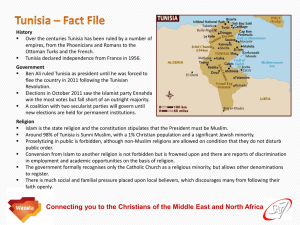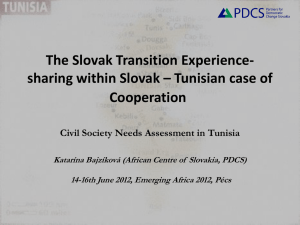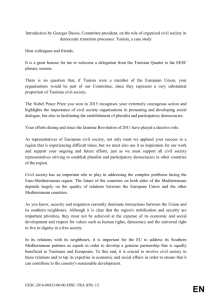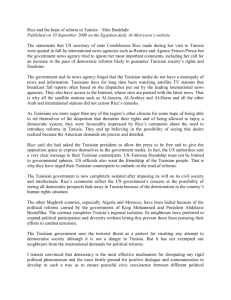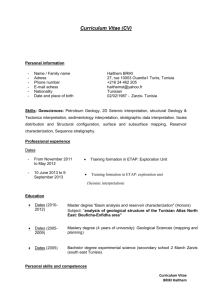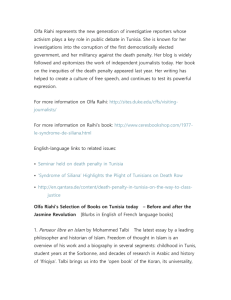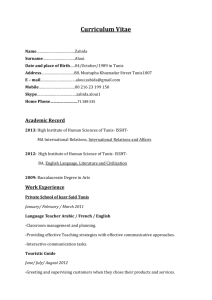TIMELINE - TUNISIA TIMELINE T
advertisement
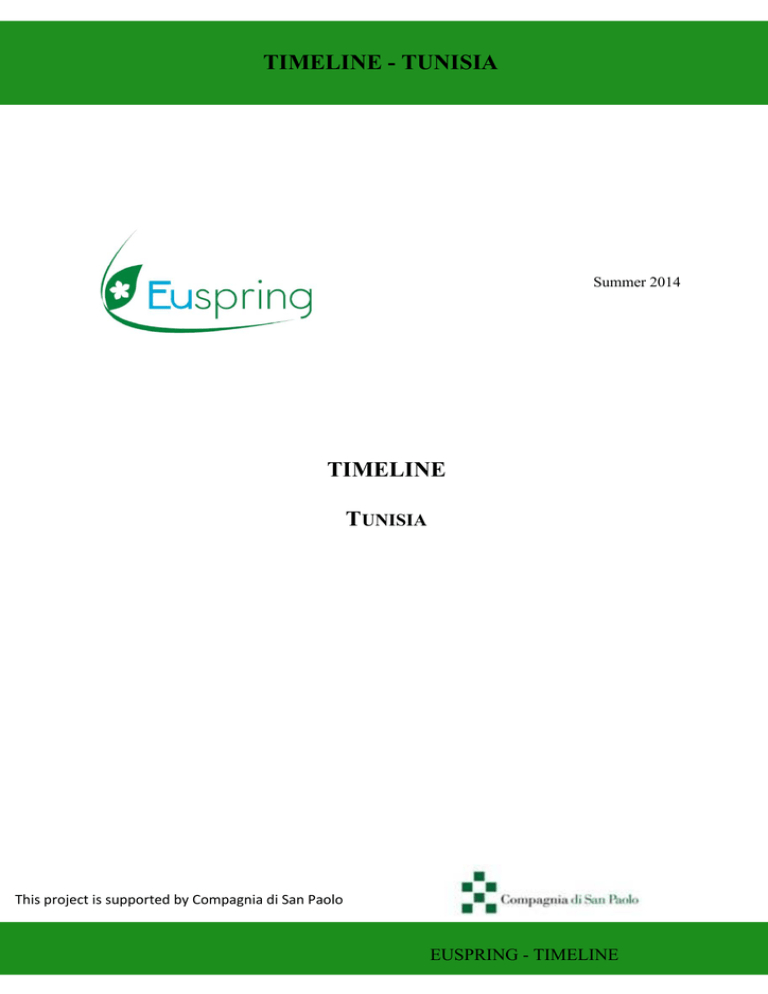
TIMELINE - TUNISIA Summer 2014 TIMELINE TUNISIA This project is supported by Compagnia di San Paolo EUSPRING - TIMELINE Dec. 17, 2010: Mohamed Bouazizi, a fruit vendor, sets himself on fire in Sidi Bouzid Dec. 24, 2010: Protests break out in Sidi Bouzayen (in Sidi Bouzid) and spread Dec. 28, 2010: Ben Ali condemns protests 2011 Jan.8 to 10, 2011: Bloody riots in Kasserine (center-west), as well as Thala Regueb (near Sidi Bouzid): 21 dead according to the authorities, more than 50 according to a union source. Clashes in Kairouan (center). Jan.10, 2011: Ben Ali gives a second speech in which he threatens to prosecute protesters and announces the creation of three national commissions of political reform, investigation of corruption and overruns recorded during the protests. Jan.11, 2011: First massive protests in Tunis Jan. 12, 2011: General strike in Sfax Jan. 13, 2011: Ben Ali pledges major reforms and declares that he will not run for reelection in 2014 Jan. 14, 2011: State of emergency declared, Ben Ali flees Jan. 14, 2011: Arrest of 30 members of Ben Ali's family and that of his wife. Mohamed Ghannouchi announces that the Presidency of the Republic acting in accordance with Article 57 of the constitution. Jan. 15, 2011: Speaker of Parliament, Foued Mebazaa sworn in as temporary president (the Prime Minisiter is Muhammad Ghannouchi, a close ally of Ben Ali) Jan. 17, 2011: Prime Minister Ghannouchi promises to announce a new coalition government and a new “unity” government which includes several Ben Ali loyalists Jan. 18, 2011: Tunisians take to the streets in protest, Ghannouchi and Mebazaa resign from the RCD, Moncef Manzouki returns to Tunisia Jan. 19, 2011: Liberation of 1,800 detainees (members of Ennahda) Jan. 23, 2011: "The march of freedom" from Sidi Bouzid to Tunis, asking for the dismissal of the government. Jan. 26, 2011: Clashes break out near government offices in Tunis’ old city Jan. 27, 2011: Tunisia’s foreign minister, Kamel Morjane resigns. Jan. 30, 2011: After 22 years of exile, Rachid Ghannouchi, leader of banned Islamist party alNahda, returns to Tunisia EUSPRING - TIMELINE Feb. 19, 2011: Establishment of the High Authority for the Achievement of the Revolution Objectives, Political Reform and Democratic Transition (Hiror), chaired by Ben Achour Yadh. Feb. 20, 2011: Organization of the sit-in at El Kasbah 2 to demand the resignation of Mohamed Ghannouchi and the creation of the National Constituent Assembly. Feb. 25, 2011: Protests against interim government led by Mohamed Ghannouchi (Prime Minister) Feb. 27, 2011: Mohamed Ghannouchi resigns, Beji Caid-Essebsi takes his place March 9, 2011: RCD is dissolved March 15, 2011: Establishment of the Independent High Authority for the Elections (Isie), chaired by Kamel Jendoubi. April 29, 2011: Senior members of the RCD are banned from participating in the upcoming elections for the constituent assembly, a body tasked with rewriting Tunisia’s constitution and appointing a new government May 9, 2011: Thirteen people are chosen to serve on the Tunisian Higher Election Authority (ISIE), an independent group overseeing the constituent assembly election May 31, 2011: Four secular parties unite to form the Democratic Modernist Coalition (PDM) June 8, 2011: Reporting the date of the elections of the Constituent Assembly to October 23. June 20, 2011: Ben Ali and his wife are sentenced in absentia to 35 years in prison for theft and unlawful possession of cash and jewelry July 11, 2011: Voter registration for the constituent assembly election begins August 14, 2011: Voter registration ends. The Carter Center states that, according to the ISIE, 3,882,727 Tunisians have registered to vote. Sept. 1, 2011: Registration begins for political parties and independent lists to place candidates in the October 23 constituent assembly election; 81 parties, and hundreds of independents, end up registering Sept. 15, 2011: Twelve Tunisian parties sign an agreement called “Declaration of the Transitional Process” Oct. 1, 2011: Campaigning begins for the constituent assembly election, to be held on October 23 Oct. 7, 2011: Beji Caid Essebsi, Prime Minister of the transitional government, received at the White House. Oct. 20. 2011: Campaigning ends for the constituent assembly election; Overseas voting for Tunisians living abroad also begins Oct. 23, 2011: About 4.4 million registered Tunisians head to the polls to begin voting in an historic election. EUSPRING - TIMELINE Oct. 27 & 28, 2011: Violence in Sidi Bouzid after the cancellation of several lists of winners AlAridha. Nov. 22, 2011: The Constituent Assembly elects its president, Mustapha Ben Jaafar, chairman of the party Ettakattol. Dec. 11, 2011: The Constituent Assembly adopted the draft statute on the provisional organization of public authorities. Dec. 12, 2011: Moncef Marzouki elected by the national constituent assembly as the new president; interim government presided by Hamadi Jebali (from al-Nahda). The constituent assembly starts drafting the new Constitution. Dec. 22, 2011: Presentation of the new government led by Mr Jebali Constituent Assembly. 2012 Jan. 9, 2012: Several hundred journalists demonstrated in Tunis to protest at the appointment of media bosses by the government, which they regard as a return to bad practices of the past. Jan. 18, 2012: Five Tunisian students said they went on hunger strike against a ban on niqab veils imposed by Manouba university, upping the ante in a dispute which began in November. Jan. 24, 2012: Tunisian police ended a weeks-long sit-in by conservative Muslims at Manouba university that banned the full-face veil. Feb. 25, 2012: More than 3,000 protesters rallied in Tunis to call for the country's moderate Islamist government to resign after accusations that ruling party activists had defaced union offices. US Secretary of State Hillary Clinton pledged that Washington would help Tunisia rebuild its economy and cement democracy. Mar. 16, 2012: Several thousand men and women demonstrated outside the parliament to demand the inclusion of Islamic law in the country's future constitution. Mar. 20, 2012: Thousands of Tunisians gathered in defense of liberty as they marked Independence Day amid fears of a widening divide between secular and religious groups. Mar. 24, 2012: Beji Caid Essebsi (85), the man who steered the country in the aftermath of its January 2011 revolution, came out of retirement to criticize the Islamist-led government and galvanize a secular opposition. Mar. 25, 2012: At least 8000 Islamists staged a mass demonstration in central Tunis in the latest show of force to demand the adoption of Islamic law. Mar. 26, 2012: A top official in Tunisia's ruling Islamist Ennahda Party says Islamic law will not be enshrined in the country's new constitution, preserving the North African nation's civil state. Mar. 28, 2012: Tunisia's interior ministry banned demonstrations on the capital’s main avenue which has become a hub of protests since the fall of Zine el Abidine Ben Ali in January last year. EUSPRING - TIMELINE Mar. 31, 2012: Tunisia's Religious Affairs Minister Nourredine al-Khademi says the country will take stock of the hundreds of mosques now in the hands of ultra-conservatives. He estimates that about 400 of more than 5000 mosques have fallen under the sway of Salafist extremists. Apr. 7, 2012: Several Tunisian centrist parties including the center-left PDP agree to join forces. Apr. 9, 2012: Tunisian police fire tear gas to disperse a rally on Bourguiba Avenue in central Tunis where demonstrations are banned. Hundreds of demonstrators mark Martyrs' Day (1938) and protest against the ban imposed on March 28. At least 15 civilians and eight policemen were hurt. The journalists' union called on its members to boycott Interior Minister Ali Larayedh for a week over the crackdown. May 1, 2012: Over 20,000 people marched for national unity, chanting slogans borrowed from the popular uprising that toppled Zine El Abidine Ben Ali over a year ago. May 3, 2012: A Tunisian court slapped a small fine on the head of the Nessma television station for undermining morality by screening the film "Persepolis," which included depictions of God. May 20, 2012: In Qayrawan thousands of hardline Ansar al-Sharia Islamists, some in Afghan military garb and waving swords, converged to rally for one of the country's most radical religious movements. May 21, 2012: Military police confiscates the cameras of Ramzi Bettaieb, who works for Nawaat, a collective blog, while filming the trial of Ben Ali and 22 co-accused in the northwestern town of Kef over their role in crushing anti-regime protests. On May 28 he launches a hunger strike to defend press freedom. May 26, 2012: Salafists clash in Tunisian town of Jendouba. Hundreds of Salafists have clashed with security forces and attacked a police station in Jendouba. May 30, 2012: Tunisia’s PM Hamadi Jebali said Tunisians have lost patience with hardline Islamists sowing violence in the country, and authorities will deal firmly with any such groups "who believe they are charged by God to purify society." Jun. 10, 2012: Hundreds of extremists destroyed artworks at an exhibit in the Tunis suburb of La Marsa that included paintings that caricatured Mecca, portrayed a nude woman, and showed the word "Allah" spelled with strings of ants. On July 4 a Tunisian court sentenced court official Mohamed Ali Bouaziz to two months in jail on charges of inciting the riots. Jun. 13, 2012: A Tunisian military court convicts former president Zine El Abidine Ben Ali in absentia of inciting violence and sentenced him to 20 years in prison. Tunisia has repeatedly asked Saudi Arabia to extradite Ben Ali so he can face the charges in person. Calm returned after days of riots by radical Islamists across the country left 62 members of the security forces injured and led to 162 arrests. Jun. 23, 2012: Libya ex-PM extradition 'illegal'. Tunisian President Moncef Marzouki has said that his country's extradition of Libya's former Prime Minister al-Baghdadi al-Mahmoudi was 'illegal' Jul. 4, 2012: The independent Tunisian authority (INRIC) charged with reforming the media EUSPRING - TIMELINE announced that it had shut down after failing to achieve its objective, accusing the Islamistdominated government of censorship. Jul. 25, 2012: Tunisian President Moncef Marzouki pardones 1300 prisoners to mark national day, the 55th anniversary of the proclamation of the republic Jul. 25, 2012: Tunisian Finance Minister Houcine Dimassi resignes following a disagreement with the policies of the government led by Islamist PM Hamadi Jebali. Dimassi complained of excessive spending. Aug. 8, 2012: ANC publishes the first Constitutional draft Aug. 2012: Thousands protest in Tunis against moves by Islamist-led government to reduce women's rights. Draft constitution refers to women as "complementary to men", whereas 1959 constitution granted women full equality with men. Aug. 27, 2012: Tunisia extends the state of emergency in the country for another month ahead of the start of the new school year over fears of increased violence. This was the 8th extension following the popular uprising that overthrew long-ruling dictator Zine El Abidine Ben Ali a year and a half ago. Sept. 14/15, 2012: Anti-Islam film protests escalate. Protesters angered by a film made in the US and mocking Islam have attacked Western embassies in Tunisia, Libya and Sudan. US orders staff out of Sudan and Tunisia. US Ambassador in Libya is killed. Oct. 5, 2012: Police rape a woman, then charge her with indecency. Outraged Tunisians took to the streets by the hundreds, angrily protesting the treatment of a woman who was allegedly raped by police officers. President issues 'State apology'. Oct. 16, 2012: Five masked men stormed into the shrine of Sayyeda Aicha Manoubia, a 13th century holy woman, near the capital Tunis that had previously been threatened by religious conservatives and set it on fire. Nov. 27, 2012: The World Bank approves a $500 million loan to help support reforms in Tunisia's financial sector to encourage investment and growth. Nov. 30, 2012: The Tunisian army moves into the southwestern town of Siliana, in the fourth day of protests that have injured more than 300 people. President Moncef Marzouki said on television that the country's government has not "met the expectations of the people" and asked that a new one, smaller and specialized to deal with the unrest, be formed. Dec. 14, 2012: ANC publishes the second Constitutional draft Feb. 6, 2013, Chokri Belaid, leftist opponent to Islamists, is killed. al-Nahda rejects opposition allegations that it was behind the killing. PM Hamadi Jebali announced he would dissolve the government and form a new one of nonpartisan technocrats to manage the country until elections Feb. 8, 2013: Tens of thousands of Tunisians chanting anti-government slogans converged on a cemetery for the funeral of an assassinated leftist opposition politician, as military helicopters hovered overhead and tensions threatened to boil over into further violence. EUSPRING - TIMELINE Feb. 9, 2013: Several thousand supporters of Tunisia's ruling moderate Islamist party rallied in the capital in a pro-government demonstration. Protesters hurled insults at France, accusing the former colonial ruler of interfering in the North African country's politics. Feb. 10, 2013: Tunisia’s state news agency reported that the Congress for the Republic party, led by President Moncef Marzouki, is quitting the coalition government, which is led by Islamist party alNahda. Feb. 19, 2013: Prime Minister Jebali resigns after his ruling Islamist al-Nahda party rejects his proposals to form a government of technocrats. after the killing of an opposition anti-Islamist leader. Feb. 22, 2013: Tunisia's ruling Islamist party asks Ali Larayedh, the interior minister to form a new government. March 14-19 Discussion of Law on Judicial Authority March 21- April 26 Committee meetings to prepare final draft March 21 – April 27 Committee Meetings to prepare priority legislation April 27 Deadline for final constitution draft April 27 Presenting final draft to Presidents April 27 – May 8 Plenary sessions to vote on laws May 13-14 Discussion of constitution general report May 15 July 5 Discussion of individual articles of constitution July 8 Beginning of voting on Constitution July 10 – September 13 Preparation, discussion and approval of electoral law 2013 July - Assassination of opposition politician Mohamed Brahmi prompts mass demonstrations, a general strike and calls for the government to resign 2013 July – Nearly 60 deputies of the opposition leave the work of the Constitutional Assembly 2013 October - Governing Islamist party, Ennahda, signs an agreement with the opposition which requires it to leave the government. The start of the National dialogue is mediated by the quartet led by UGTT 2013 December - After months of wrangling, Ennahda and the mainly secular opposition agree on appointment of Mehdi Jomaa as head of interim government. 2014 January - Parliament passes the country’s first Constitution since President Ben Ali was ousted in 2011. Prime minister-designate Mehdi Jomaa forms cabinet of independents and technocrats, to govern until new elections. EUSPRING - TIMELINE 2014 January – Election of the Instance Superieure Independante pour les Elections headed by legal scholar Chafik Sarsar. 2014 February - The government says the suspected assassin of opposition politician Chokri Belaid has been killed in an anti-terrorist operation. 2014 March - President Marzouki lifts the state of emergency imposed in 2011 during the revolution that toppled his predecessor, Zine el Abidine Ben Ali. 2014 May – Tunisia’s interim parliament approves a new electoral law to govern legislative and presidential elections, due to be held by the end of this year. 2014 June/July – Several attacks are conducted in Mount Chaanbi by terrorists toward Tunisian army officers. Critical junctures are events which have relevant implications for the empowerment of citizenship rights and which have encouraged the debate at the political level and/or mobilization at the social level. EUSPRING - TIMELINE
